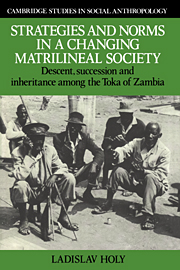 Strategies and Norms in a Changing Matrilineal Society
Strategies and Norms in a Changing Matrilineal Society Published online by Cambridge University Press: 25 August 2009
The agricultural economy which the Toka practise in the tsetse-infested area of Guta is still strongly oriented to subsistence production by each household. Agriculture depends on typical slash-and-burn techniques. Clearing a portion of woodland for the fields with an axe is done by men, although women and children might assist, particularly with the piling of the cut vegetation on the site and its subsequent burning. The digging of the field with a hoe and its sowing immediately after the onset of the rains is the work of women. Subsequent weeding is mainly carried out by women and children, though men often help. Harvesting is exclusively women's work.
A household consisting of an elementary or polygynous family is a viable unit of production. Under normal circumstances it disposes of enough labour to carry out all the agricultural work, and does not cooperate regularly with other households in the village. It seeks their help only if the successful performance of the work in the fields is threatened due to a temporary lack of labour, typically caused by illness, the woman's pregnancy or the man's temporary absence from the village as a labour migrant. The help of other households, which might then be needed in clearing the new field or possibly in weeding, can easily be mobilised through an offer of beer.
In other Toka areas which are free of tsetse fly, the use of the plough has radically altered the traditional relations of production.
To save this book to your Kindle, first ensure no-reply@cambridge.org is added to your Approved Personal Document E-mail List under your Personal Document Settings on the Manage Your Content and Devices page of your Amazon account. Then enter the ‘name’ part of your Kindle email address below. Find out more about saving to your Kindle.
Note you can select to save to either the @free.kindle.com or @kindle.com variations. ‘@free.kindle.com’ emails are free but can only be saved to your device when it is connected to wi-fi. ‘@kindle.com’ emails can be delivered even when you are not connected to wi-fi, but note that service fees apply.
Find out more about the Kindle Personal Document Service.
To save content items to your account, please confirm that you agree to abide by our usage policies. If this is the first time you use this feature, you will be asked to authorise Cambridge Core to connect with your account. Find out more about saving content to Dropbox.
To save content items to your account, please confirm that you agree to abide by our usage policies. If this is the first time you use this feature, you will be asked to authorise Cambridge Core to connect with your account. Find out more about saving content to Google Drive.